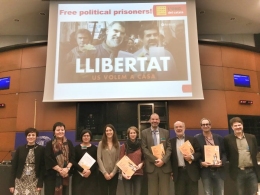The president of the Plataforma per la Llengua, Òscar Escuder, appeared before the Intergroup for Traditional Minorities, National Communities and Languages of the European Parliament on Thursday. From the outset, Escuder emphasised to the MEPs that Catalan has more than 10 million speakers in 3 European Union states, hence "it is not, properly speaking, a minority language, but rather a minoritised language", because it is a strong language in areas such as the Internet or the media.
Escuder expounded Catalonia's political situation to the Members of Parliament. As far as linguistic rights are concerned, the Catalan NGO's representative surprised the audience by informing them that Catalan, the 14th EU language in terms of number of speakers, is suffering from a situation of "structural discrimination" by the Spanish state. This is endorsed by circumstances such as the fact that public workers do not need to know the language of Catalonia or that only 8% of court sentences are drafted in Catalan, because "future judges receive no type of training in Catalan". "The public services deny us the right to speak Catalan, even in our own territory", said Escuder, who expounded certain linguistic aggressions, such as the citizen who was harassed at El Prat airport for addressing a Spanish police officer in his own language.
The Catalan NGO gave the MEPs the reports about the discriminations occurring in the websites of the state administration - only 1.6% of which are in Catalan - and that "Catalan language needs a state in its favour to guarantee its survival", since "the Spanish state engages in linguistic supremacism controlled by the State's administrative apparatus, in which Spanish is superior and seeks to ostracise languages such as Catalan, which eventually become minoritised languages". Òscar Escuder asked the MEPs to work towards allowing Catalan to be used before the European Commission in the same conditions as Spanish, and to lobby president Antonio Tajani to be able to use this language in the European Parliament. Moreover, he called upon them to collaborate with la Plataforma per Llengua to monitor legislative procedures that can affect Catalan's legal status
The defence of civil and political rights and a call for the liberation of the Jordis. In his intervention, Òscar Escuder made reference precisely to the fragile situation of Civil Rights in Catalonia, due to the repression against movements that are in favour of the right to decide. He stated that "Catalonia is immersed in an abnormal situation in which we are literally beaten for installing ballot boxes, and in which the leaders of our civil society who, in an extraordinary and peaceful way organised the largest mobilisations of recent years, are incarcerated". For this reason, la Plataforma per la Llengua has conveyed to the MEPs the need to help in any way they can to make it known that in the 21st Century, Spain has political prisoners and that they support their liberation. The MEPs took great interest in this matter in the course of the working days organised by la Plataforma per la Llengua this week at the headquarters of the European Parliament in Strasbourg, which demonstrated the substantial interest taken by many EU countries in the current political situation in Catalonia. Òscar Escuder explained that "the majority of MEPs would like to talk at length about the way we feel, and the next steps that we will take as a European nation". "The MEPs told us that they realise that the Spanish state has imprisoned people who have committed no crime, and merely for having led a strong social movement", concluded Escuder.




